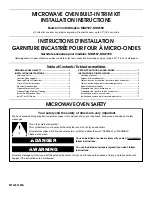
12
35
M
MEEA
ATT,, FFIISSHH,, A
ANNDD PPO
OUULLTTRRYY TTIIPPSS
When drying meat for stews or soups, do not forget that the meat must be
cooked prior to drying to prevent diseases such as e.coli and salmonella. After
cooking, cut the meat into small cubes and place it in the dehydrator. Dry until
all moisture has been removed. When you are ready to make your stew, simply
re-hydrate the meat by soaking it in water or broth approximately 1-
½
hours,
or until tender.
Beef
Choose lean cuts. Beef flank steak, rounds, or rumps are better choices than
chucks or ribs.
Poultry
All poultry
MUST
be cooked before drying. Steaming or roasting are the best
methods. Chicken breasts are leaner than dark meat, and thus better
candidates for dehydration.
Fish
Steaming fish prior to dehydration is the best preparation method. If you
choose to bake it, pre-heat your oven to 200
º
F and bake for approximately 20
minutes or until fish is flaky. Sole and flounder are excellent choices for
dehydration, but nearly any fish will do.
Flowers
The flowers should be picked after the dew has dried and before the evening
dampness begins. Flowers should be dried as quickly and as soon as possible
after picking. Discard any damaged or brown leaves. Place in trays without
overlapping. Drying times will vary widely depending on the size and type of
flower. Drying time may vary between 2 and 36 hours.
Herbs
Rinse and shake off excess water, then pat dry. Remove dead or discolored
leaves. If using seed, pick when pods have changed color. All herbs should be
left on the stem, do not remove the stems before or after dehydration.
Spread herbs loosely on the drying tray. Dehydration time will vary according
to the size and type of herb. Time may vary between 2and 6 hours.
DDRRYYIINNGG O
OTTHHEERR IITTEEM
MSS
DDEEHHYYDDRRA
ATTIINNGG GGUUIIDDEE
Plums
PREPARATION:
Rinse, halve and remove pits. Flatten plum halves by pressing
them between your hands. Or, cut halves into
¼
-inch slices.
PRETREATMENT:
Not necessary.
DEHYDRATE:
Dry halved plums at 100
º
for approximately 72 hours. Dry sliced
plums at 100
º
for 30 to 35 hours. Dried plums (prunes) should be leathery
with no pockets of moisture.
REHYDRATE:
Optional. Soak in cold water for 2 hours; drain. Or, soak in hot
water or fruit juice for 10 minutes; drain. You can also steam prunes for 5
minutes; drain.
LEATHER:
Dried plums (prunes) work well for leather, but you may wish to mix
them with other fruit purees because of their laxative effect.
NOTE
•
Dehydrating 2
½
lbs. fresh plums yields about 1 lb. dried prunes.
•
Use dried plums in both sweet and savory dishes.
Potatoes
PREPARATION:
Scrub, peel and rinse. Dice, grate or cut into
¼
-inch slices.
PRETREATMENT:
Ascorbic acid or citric acid. Soak in ascorbic acid solution or
lemon juice for 5 minutes; drain.
DEHYDRATE:
Dry at 100
º
approximately 8 hours, until crisp.
REHYDRATE:
Soak in cold water for 30 minutes; drain and pat dry.
NOTE
•
Without pretreatment, potatoes will turn black.
•
Dried potatoes are great for layered potato dishes, such as scalloped
potatoes, or added to casserole dishes.
•
To easily convert recipes that call for potatoes by the pound, weigh
the potatoes before dehydration and note the original weight on the
storage container.











































